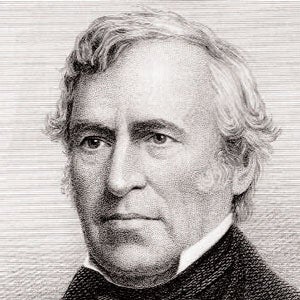
Taylor's military successes in the Mexican War – and a quarter of a century's previous experience policing the frontiers against Native Americans – made him an attractive candidate to northerners; the fact that he was a slave-owner (he had a plantation in Mississippi) was attractive to southern voters. This mixed appeal allowed the famously dishevelled Taylor to defeat more polished rivals such as Lewis Cass, the Democratic candidate, and Martin Van Buren, who ran for the short-lived Free Soil Party (which opposed slavery).
His presidency was dominated by the issue of slavery, which he attempted to deal with in the same rule-of-thumb fashion that he had used as a soldier.
To end the dispute over slavery in newly acquired areas, he urged settlers in New Mexico and California to draft constitutions and apply for statehood. (Traditionally, people could decide whether they wanted slavery when they drew up new state constitutions.) Southerners were furious, since neither state constitution was likely to permit slavery; Members of Congress were dismayed, since they felt that the President was usurping their policy-making prerogatives. Taylor's rough-and-ready solution ignored several important side issues, such as the northern dislike of the slave market operating in the District of Columbia; and southern demands for a more stringent fugitive slave law.
By February 1850, southern leaders were threatening secession. Taylor held a stormy conference, in which he told them that, if necessary, he would personally lead the Army in order to enforce the law and the Union. Persons "taken in rebellion against the Union, he would hang... with less reluctance than he had hanged deserters and spies in Mexico."
He never wavered from this uncompromising stance for the remainder of his presidency; which did not, however, last long. That summer, he participated in a lengthy 4 July ceremony at the Washington Monument, on a blisteringly hot day. His thirst and exhaustion caused him to accept a snack of cherries and milk (and, possibly, other offerings from onlookers). He fell ill almost immediately, and died five days later.
The tensions over slavery that he had attempted to resolve survived his presidency, but would not explode into civil war for another decade.
In his own words
"For more than half a century, during which kingdoms and empires have fallen, this Union has stood unshaken. The patriots who formed it have long since descended to the grave; yet still it remains the proudest monument to their memory... In my judgement, its dissolution would be the greatest of calamities."
In others' words
"He talks artlessly as a child about affairs of state, and does not pretend to a knowledge of anything of which he is ignorant. He is a remarkable man in some respects and it is remarkable that such a man should be President of the United States."
Congressman Horace Mann
"Few men have ever had a more comfortable, labour-saving contempt for learning of every kind." General Winfield Scott
Minutiae
Actress Lillian Gish claimed to be descended from him.
When he was 17, he swam across the Ohio River and back.
Taylor chewed a lot of tobacco, and was said to be an unusually gifted marksman with a spittoon.
His wife, Peggy, hated the idea of her husband becoming president and prayed every day for his defeat during the 1848 election campaign. Chronic illness prevented her from serving as First Lady. Her daughter Betty took the role instead, while Peggy remained in seclusion on the second floor of the White House.
He was the first president not to have previously held any other elected public office.
His will was deemed inadmissible for probate, as it had been drafted on the assumption that he would die in combat.
Not until Woodrow Wilson, more than 60 years later, would another southerner be elected president.
Conspiracy theorists have suggested that Taylor was assassinated. In 1991, Taylor's remains were exhumed, but the minute traces of arsenic found in tissue samples were considered too insignificant to be attributable to poisoning.
Subscribe to Independent Premium to bookmark this article
Want to bookmark your favourite articles and stories to read or reference later? Start your Independent Premium subscription today.

Join our commenting forum
Join thought-provoking conversations, follow other Independent readers and see their replies